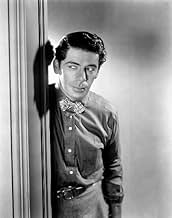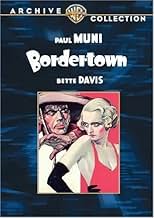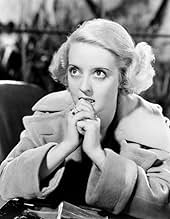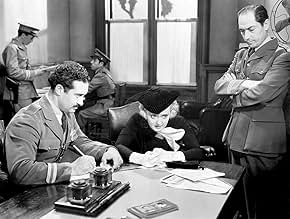NOTE IMDb
6,6/10
2,1 k
MA NOTE
Ajouter une intrigue dans votre langueIn Mexico, a former lawyer becomes the invaluable second-in-command to a casino owner, whose wife begins to fall for him.In Mexico, a former lawyer becomes the invaluable second-in-command to a casino owner, whose wife begins to fall for him.In Mexico, a former lawyer becomes the invaluable second-in-command to a casino owner, whose wife begins to fall for him.
- Réalisation
- Scénario
- Casting principal
Soledad Jiménez
- Mrs. Ramirez
- (as Soledad Jimenez)
William B. Davidson
- Dr. Carter
- (as William Davidson)
Oscar Apfel
- Judge Rufus Barnswell
- (non crédité)
Wade Boteler
- Man Wanting to Buy Roark's Casino
- (non crédité)
Jack Chefe
- Waiter
- (non crédité)
Wallis Clark
- Friend of Dean on Podium
- (non crédité)
Carlos De Valdez
- Magistrado
- (non crédité)
Avis à la une
Paul Muni was an East European Jew, so naturally he was cast as a Hispanic Californian.
Well, heck, to name just one, Leo Carrillo, a native Hispanic Californian, was cast as everything from Greek to French to Italian to Latino, and so many other "ethnic" actors played various nationalities besides their own heritages.
Muni apparently wore dark makeup for this role, but it wasn't a stereotype; it was, in fact, a very sympathetic character.
Bette Davis never looked lovelier. For years, I have tried to spread my conspiracy theory that she was not made up, but made down, that she was, in fact, a very lovely lady and the Westmore family apparently had it in for her and put the make-up on in such a way that her looks were coarsened, and she was aged long before her time.
She was such a great actress that her looks didn't matter, but she was very attractive and I find it a shame she wasn't allowed to show her natural beauty.
The female, though, who stole this movie, both in looks and in animated characterization, was Margaret Lindsay. She was absolutely fascinating in this role as spoiled rich girl, an almost good guy. In fact, she made this movie worth seeing.
The presence of a genuine Hispanic, Soledad Jiménez, gives one pause to wonder why more genuine Hispanics weren't cast in movies like this. She was just great.
The ending was rather puzzling, perhaps a sop to somebody's nativism, but the story was a good one, the acting was generally great, and all of that, with Archie Mayo's directing, make this one worthwhile.
Well, heck, to name just one, Leo Carrillo, a native Hispanic Californian, was cast as everything from Greek to French to Italian to Latino, and so many other "ethnic" actors played various nationalities besides their own heritages.
Muni apparently wore dark makeup for this role, but it wasn't a stereotype; it was, in fact, a very sympathetic character.
Bette Davis never looked lovelier. For years, I have tried to spread my conspiracy theory that she was not made up, but made down, that she was, in fact, a very lovely lady and the Westmore family apparently had it in for her and put the make-up on in such a way that her looks were coarsened, and she was aged long before her time.
She was such a great actress that her looks didn't matter, but she was very attractive and I find it a shame she wasn't allowed to show her natural beauty.
The female, though, who stole this movie, both in looks and in animated characterization, was Margaret Lindsay. She was absolutely fascinating in this role as spoiled rich girl, an almost good guy. In fact, she made this movie worth seeing.
The presence of a genuine Hispanic, Soledad Jiménez, gives one pause to wonder why more genuine Hispanics weren't cast in movies like this. She was just great.
The ending was rather puzzling, perhaps a sop to somebody's nativism, but the story was a good one, the acting was generally great, and all of that, with Archie Mayo's directing, make this one worthwhile.
Archie Mayo's "Bordertown" is a film that by today's standards would be deemed politically incorrect. The idea of the poor Mexican immigrant that wants to better himself, only to see people step all over him, is at the center of this tale.
Juan Ramirez, the young lawyer, trying to defend the victim of an accident caused by the young and reckless Dale Elwell, is defeated by a much more experienced Anglo lawyer, who happened to know the system and the judge, obviously. As a result, Juan, decides to leave L.A. to go to a border town, probably Tijuana, where he becomes a partner of Charlie Roark, a decent man who sees the potential in Johnny, as he calls himself now.
What Charlie doesn't know is that he is married to a scheming woman that couldn't care less for him. She has to get rid of her husband in order to get her hands on his money and looks to Johnny to help her, but of course, he wants nothing to do with her.
Paul Muni was a great star at Warner Bros. at the time of this film. We were never fans of Mr. Muni, who in this film gives a clichéd account of the Hispanic Juan in a performance that goes over the top and doesn't convince anyone. On the other hand, Bette Davis, as Marie Roark, is her usual excellent self in a more nuanced performance. We see why later on, Ms. Davis will use all what she shows in this film and more to be the great star that she was. In minor roles, the formidable Eugene Palette plays Charlie Roark and Margaret Lindsay is seen as Dale Elwell, the rich girl that provoked the accident.
This film is a rarity seldom seen these days.
Juan Ramirez, the young lawyer, trying to defend the victim of an accident caused by the young and reckless Dale Elwell, is defeated by a much more experienced Anglo lawyer, who happened to know the system and the judge, obviously. As a result, Juan, decides to leave L.A. to go to a border town, probably Tijuana, where he becomes a partner of Charlie Roark, a decent man who sees the potential in Johnny, as he calls himself now.
What Charlie doesn't know is that he is married to a scheming woman that couldn't care less for him. She has to get rid of her husband in order to get her hands on his money and looks to Johnny to help her, but of course, he wants nothing to do with her.
Paul Muni was a great star at Warner Bros. at the time of this film. We were never fans of Mr. Muni, who in this film gives a clichéd account of the Hispanic Juan in a performance that goes over the top and doesn't convince anyone. On the other hand, Bette Davis, as Marie Roark, is her usual excellent self in a more nuanced performance. We see why later on, Ms. Davis will use all what she shows in this film and more to be the great star that she was. In minor roles, the formidable Eugene Palette plays Charlie Roark and Margaret Lindsay is seen as Dale Elwell, the rich girl that provoked the accident.
This film is a rarity seldom seen these days.
A film where everyone gets whats coming to them, and true to the 1930's formula, in melodramatic fashion. Featuring the now forgotten Paul Muni (was he really a superstar back then?) as a Hispanic lawyer who learns a hard lesson about the facts of life. Muni, as usual plays it weird; before and after Bordertown, he is a pretty normal guy but while he is in Bordertown he becomes a Hispanic parody. But nevermind that, this film has Bette Davis playing yet another scheming psychopath as only she can. Like the several other Davis movies that she had a minor role in ("Fog over Frisco" and "In This Our Life", to name two), her twisted character stays with you long after she is gone. Plus, she's a blonde! Yowza!
"Bordertown" features a far more convincing performance from Paul Muni, who manages to curtail his usual theatrical approach to film acting. Bette Davis is an excellent female lead for Muni and their scenes radiate with tension. Maragret Lindsay is OK in the supporting cast but she isn't in Davis's league. Paul Muni plays a newly qualified lawyer who decides to make a career for himself near the Mexican border after some problems earlier on in the film. He is employed by a wealthy businessman (Eugene Pallete) to handle all the legal wranglings for his building firm. However, trouble soon rears its head in the form of the businessman's wife, Bette Davis. The second half of "Bordertown" was remade by "Warner Bros" for the 1940 film, "They Drive By Night." It is a coin toss as to who is more fiery and feisty out of Bette Davis and Ida Lupino in the same role. For me, it is an even draw. The plot and the narrative are both strong and with some good dialogue. This is one of the best films Paul Muni whilst at "Warner Bros."
BORDERTOWN (Warner Brothers, 1935), directed by Archie Mayo, stars Paul Muni in one of his many ethnic characterizations for which he is famous. Best known for his Italian accented SCARFACE (1932), followed by his latter biographical passages as both French Louis Pasteur and Emile Zola, along with the Chinese Wang in THE GOOD EARTH (1937), Muni attempts one that of a Mexican who breaks away from his people to make something of himself outside his jurisdiction. As much as BORDERTOWN virtually belongs to Muni during its entire 90 minutes, the movie overall is noted more as a Bette Davis film shortly before her achieving super stardom by 1937. Even though Davis' character comes late into the story (35 minutes from its start), she makes the most out of her character enough to gather the most attention.
Johnny Farada Ramirez (Paul Muni), is a young Hispanic man living with his people in the Mexican quarter of Los Angeles, California. Labeled "THE tough guy of a tough neighborhood," Johnny has made something of himself by studying five years at the Pacific Night Law School, and graduating with other would-be lawyers of all ethnic background. With a diploma in hand, as witnessed by his aged mother (Soledad Jimenez) and close friend, a priest, better known as Padre (Robert Barrat). Johnny abandons his garage mechanical job and opens a law office of his own. After leaving the Café La Paloma with her escort and lawyer friend, Brook Mandigan (Gavin Gordon), socialite Dale Elwell (Margaret Lindsay) drives off in high speed down the road, crashing into the truck driven by Johnny's poor friend, Miguel Diego (Arthur Stone). For his very first courtroom case, Johnny poorly constructs himself, losing his case for Miguel, as told to him in the chambers of the Judge (Samuel S. Hinds). After being called a shyster lawyer by Mandigan, Johnny loses his temper by striking Dale's acting attorney. His savage actions find Johnny disbarred. Feeling Mandigan and Dale won their case because they have money, Johnny's goal now to leave home, make something of himself and earning enough money for himself to become respected. A year later, the once down-and-out Johnny Ramirez has now risen from ballroom bouncer to adviser and partner to Charlie Roark (Eugene Pallette), owner of a gambling casino, The Silver Slipper. Knowing his full worth, Johnny wants and gets his 25 percent interest in Roark's business, thanks to Roark's young and attractive wife, Marie (Bette Davis), who happens to be much more interested in Johnny than her middle-aged, fat businessman husband. Because Marie's married to his friend, Johnny respects Charlie and stays away from his wife. After Charlie meets with an accidental death, Johnny inherits Roark's business and renames it La Rueda Casino. While the business is successful, Marie demands more than money. When she discovers Johnny has been seeing Dale Elwell, who's come back into his life to be with her "savage," Marie stops at nothing to break up their relationship. Other members in the cast include familiar Warner Brothers stock players as William B. Davidson (Doctor Carter, the dentist); Hobart Cavanaugh (Howie); and Henry O'Neill (J. Elwell Benson). Look for Arthur Treacher (Roberts, the Butler) and Akim Tamiroff in uncredited roles. If some of the plot sounds familiar, certain scenes were revamped into a trucking story titled THEY DRIVE BY NIGHT (Warner Brothers, 1940) starring George Raft, Ann Sheridan, Ida Lupino and Humphrey Bogart. Raft assumes the Muni part as the ambitious trucker while Alan Hale plays the Pallette part of boss and business partner, but it's Ida Lupino who comes off best reprising Davis' impulsive Marie. While Lupino's performance was easily a standout, her performance is over the top acting as opposed to Davis doing very much the same but in a better and more natural style. For BORDERTOWN, Davis shows her early ability to become a good dramatic actress, especially during the courtroom scene where her method of going insane is different and better constructed than Lupino's.
Though the role of the ambitious Mexican Johnny could have been played by a Hispanic-born actor as Gilbert Roland for example, it's the better known Paul Muni, in darker hairstyle and Spanish accent, who becomes more Mexican by being as opposed to playing a Mexican. Though noted for not being one to be type-cast by playing the same role twice, Muni played a Mexican once more, this time as a historical figure of JUAREZ (1939). Though Bette Davis became Muni's co-star once again, she and Muni shared no scenes together in what would have been their second (and final) collaboration. BORDERTOWN is nearly a forgotten melodrama known for its early screen depiction of racial prejudice among Hispanic-Americans, and a Mexican's uneasy struggle for equality with the outside world. It's not only available on DVD, but can be seen from time to time on cable television's Turner Classic Movies. (*** jumping beans)
Johnny Farada Ramirez (Paul Muni), is a young Hispanic man living with his people in the Mexican quarter of Los Angeles, California. Labeled "THE tough guy of a tough neighborhood," Johnny has made something of himself by studying five years at the Pacific Night Law School, and graduating with other would-be lawyers of all ethnic background. With a diploma in hand, as witnessed by his aged mother (Soledad Jimenez) and close friend, a priest, better known as Padre (Robert Barrat). Johnny abandons his garage mechanical job and opens a law office of his own. After leaving the Café La Paloma with her escort and lawyer friend, Brook Mandigan (Gavin Gordon), socialite Dale Elwell (Margaret Lindsay) drives off in high speed down the road, crashing into the truck driven by Johnny's poor friend, Miguel Diego (Arthur Stone). For his very first courtroom case, Johnny poorly constructs himself, losing his case for Miguel, as told to him in the chambers of the Judge (Samuel S. Hinds). After being called a shyster lawyer by Mandigan, Johnny loses his temper by striking Dale's acting attorney. His savage actions find Johnny disbarred. Feeling Mandigan and Dale won their case because they have money, Johnny's goal now to leave home, make something of himself and earning enough money for himself to become respected. A year later, the once down-and-out Johnny Ramirez has now risen from ballroom bouncer to adviser and partner to Charlie Roark (Eugene Pallette), owner of a gambling casino, The Silver Slipper. Knowing his full worth, Johnny wants and gets his 25 percent interest in Roark's business, thanks to Roark's young and attractive wife, Marie (Bette Davis), who happens to be much more interested in Johnny than her middle-aged, fat businessman husband. Because Marie's married to his friend, Johnny respects Charlie and stays away from his wife. After Charlie meets with an accidental death, Johnny inherits Roark's business and renames it La Rueda Casino. While the business is successful, Marie demands more than money. When she discovers Johnny has been seeing Dale Elwell, who's come back into his life to be with her "savage," Marie stops at nothing to break up their relationship. Other members in the cast include familiar Warner Brothers stock players as William B. Davidson (Doctor Carter, the dentist); Hobart Cavanaugh (Howie); and Henry O'Neill (J. Elwell Benson). Look for Arthur Treacher (Roberts, the Butler) and Akim Tamiroff in uncredited roles. If some of the plot sounds familiar, certain scenes were revamped into a trucking story titled THEY DRIVE BY NIGHT (Warner Brothers, 1940) starring George Raft, Ann Sheridan, Ida Lupino and Humphrey Bogart. Raft assumes the Muni part as the ambitious trucker while Alan Hale plays the Pallette part of boss and business partner, but it's Ida Lupino who comes off best reprising Davis' impulsive Marie. While Lupino's performance was easily a standout, her performance is over the top acting as opposed to Davis doing very much the same but in a better and more natural style. For BORDERTOWN, Davis shows her early ability to become a good dramatic actress, especially during the courtroom scene where her method of going insane is different and better constructed than Lupino's.
Though the role of the ambitious Mexican Johnny could have been played by a Hispanic-born actor as Gilbert Roland for example, it's the better known Paul Muni, in darker hairstyle and Spanish accent, who becomes more Mexican by being as opposed to playing a Mexican. Though noted for not being one to be type-cast by playing the same role twice, Muni played a Mexican once more, this time as a historical figure of JUAREZ (1939). Though Bette Davis became Muni's co-star once again, she and Muni shared no scenes together in what would have been their second (and final) collaboration. BORDERTOWN is nearly a forgotten melodrama known for its early screen depiction of racial prejudice among Hispanic-Americans, and a Mexican's uneasy struggle for equality with the outside world. It's not only available on DVD, but can be seen from time to time on cable television's Turner Classic Movies. (*** jumping beans)
Le saviez-vous
- AnecdotesAt first, Paul Muni wanted Carole Lombard or Lupe Velez as female co-star, but after her success in L'emprise (1934) he chose Bette Davis.
- GaffesWhen Johnny Ramirez shortly after losing the case leaves his home and starts hitchhiking, you see a montage of calendar months indicating the passage of time. But the dates of the month do not correspond with the year 1934, which was the year of the trial as indicated by the court papers filed. Also, the sequence of calendar dates shown in the montage is out of order. They begin with August of 1936 and end with July 1936 as opposed to July 1937.
- Citations
Marie Roark: The only fun I get is feeding the goldfish, and they only eat once a day.
- ConnexionsFeatured in Code of the Secret Service (1939)
- Bandes originalesMaria Elena
(1933) (uncredited)
Music by Lorenzo Barcelata
Played at the beginning and often in the score
Meilleurs choix
Connectez-vous pour évaluer et suivre la liste de favoris afin de recevoir des recommandations personnalisées
- How long is Bordertown?Alimenté par Alexa
Détails
- Date de sortie
- Pays d’origine
- Langues
- Aussi connu sous le nom de
- Bordertown
- Lieux de tournage
- Los Angeles, Californie, États-Unis(Olvera Street in opening scene)
- Sociétés de production
- Voir plus de crédits d'entreprise sur IMDbPro
- Durée1 heure 30 minutes
- Couleur
- Mixage
- Rapport de forme
- 1.37 : 1
Contribuer à cette page
Suggérer une modification ou ajouter du contenu manquant



































